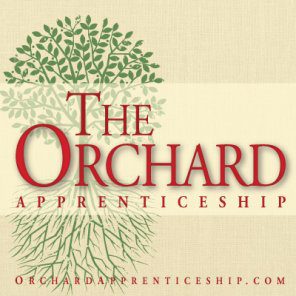What is an orchard? The easiest and most obvious answer is that it is a large field with fruit-producing trees, intentionally planted for the purpose of harvesting large quantities of fruit. The less obvious answer, however, is the one that needs to be considered.
Therefore, since “brevity is the soul of wit,”1 says Shakespeare’s Polonius, I will give the briefest answer first: The Orchard is an apprenticeship program for adults; it is a “Challenge program for adults.” If this is enough to satisfy your curiosity, you can stop reading at this point.
While brevity may be the soul of wit, it is not always thorough enough to satisfy curiosity. Therefore, I will expand upon our definition a little further. As a “Challenge program for adults,” The Orchard Apprenticeship provides Classical Conversations parents, tutors, and directors with the opportunity to get the education they never received.
What, exactly, is the education they never received? Many people have read books like Shakespeare’s Hamlet and Julius Caesar, many have read The Iliad and The Odyssey by Homer and The Aeneid by Virgil, and some have read Plato’s Meno and Gorgias. However, few of us have read them as they will be read in The Orchard. Rather than trying to analyze and break a text down into its constituent parts (losing the forest by staring at the trees!), we will read these books slowly and deliberately. We will explore them, looking for Ideal Types2: What prescriptive lessons can we learn from them? What do they teach us about man, creation, and life? What do they reveal about wisdom, rhetoric, and teaching?
Moreover, we will learn rhetoric and how to communicate the truth (which we will also learn how to identify!) beautifully and persuasively, to call our hearers to action—to live out what they have learned. Finally, we will learn how to teach others what we have learned. This way of teaching, however, will have a whole new, or rather a classical, twist. This “ain’t John-Dewey-style” teaching: this is teaching that leads students to discover truth in a way that is exciting and in a way that will cause them to want to learn. Why? Because Aristotle was right when he said, “All men by nature desire to know.”3
Truth be told, we start out desiring to learn, to know. As we get older, the spirit of inquiry natural to us gets beaten out of us! Or, one could say, it gets crushed by boredom and other frustrations. In The Orchard Apprenticeship, we will learn how to teach in a way that reignites that desire, that spirit of inquiry, within each of us. These are not just lofty promises either, but are time-tested and true. Classical Conversations is excited to share them with you.
Now, what are the technical aspects of the apprenticeship?
• It will be available only to Classical Conversations community members.
• It will be set up so that apprentices will have reading, writing, and teaching assignments.
• To ensure that we are engaging one another in a way that honors our nature as humans and as learners—as well as to continue in the model we are used to with the Challenge programs in which our children participate— we will meet twice a year in four to five daylong retreats (one in August and another in February).
• Additionally, we will meet twice monthly via conference calls to discuss teaching (one meeting) and literature (another meeting).
This has been a brief introduction to the new Classical Conversations Orchard Apprenticeship program. More information can be found at The Orchard website. You will want to monitor the Classical Conversations Facebook page and our Twitter account (although our Twitter account is not very active yet), as news will be published there, as well. Please feel free to send your questions to the email address published on The Orchard website. We look forward to hearing from you!
__________________________________
1 The Tragedy of Hamlet, Prince of Denmark, by William Shakespeare, Act II, Scene 2
2 David Hicks, in his educational treatise, Norms and Nobility (Lanham, MD: University Press of America,1999) describes the Ideal Type on pgs 43-44. Here is a brief, very simplified, excerpted definition: “Classical education’s Ideal Type…is..for all time the standard by which men shall judge themselves and others” (44).
3 Metaphysics, by Aristotle , Book I, Part I




